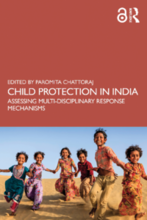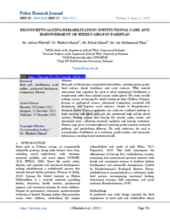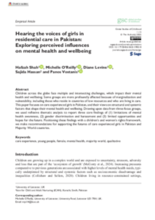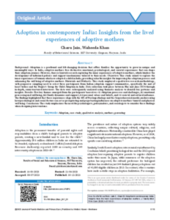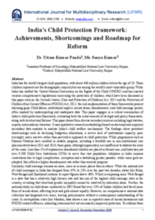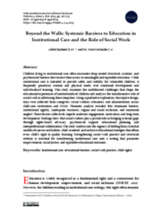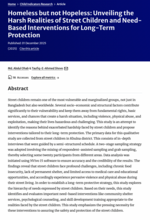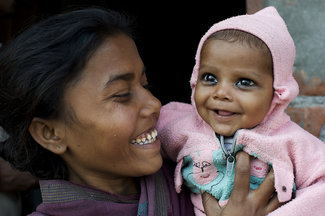

Displaying 1 - 10 of 746
This book offers a comprehensive exploration of the institutional, legal, and social frameworks surrounding child protection in India. Anchored in a multidisciplinary approach, the book brings together insights from law, social work, psychology, education, and public policy to examine how various systems interact in addressing the issues related to protection of children from abuse, neglect, trafficking, and exploitation.
This study examines whether institutional rehabilitation for street girls in Pakistan is genuinely transformative by assessing services at the Zamung Kor Model Institute through a gender- and child-centred lens. While findings show improvements in safety, emotional regulation, and educational engagement, persistent gaps in trauma-informed care, vocational pathways, and post-discharge support highlight the need to reconceptualize rehabilitation as a continuous, community-linked process.
This paper explores the mental health and wellbeing of care-experienced girls in Pakistan, highlighting how structural and systemic factors shape their experiences. Using focus group data, it identifies limited mental health awareness, gender discrimination and harassment, and restricted opportunities as key challenges, and offers recommendations framed within children’s and women’s rights to better support their futures.
This article examines how children in Nepal are migrating either within the country or across borders—sometimes alone and other times with families—driven by a range of factors including lack of parental care, poverty, limited access to education
This article describes how Mission Vatsalya’s policy framework is being translated into practice through convergence—coordinated action across ministries, departments, local governance bodies, and civil society—to strengthen family‑based care and
This paper explores the lived experiences of Bhutanese unaccompanied and separated refugee children living in camps in eastern Nepal, examining how they navigate prolonged displacement, statelessness, and institutional neglect through ethnographic and narrative methods. It argues that these children exist in a “state-of-nowhere,” rendered politically and administratively invisible within refugee governance systems, and calls for rights-based, child-centred responses that address the structural and epistemic violence shaping their exclusion.
This qualitative study explores the emotional, psychological, and social experiences of adoptive mothers in India through in-depth interviews, identifying key themes related to adoption processes, wellbeing, family dynamics, personal values, and societal influences. The findings highlight how these experiences interact with biopsychosocial factors, underscoring the need for more informed, mother-centred policies and support mechanisms in the adoption system.
This paper critically examines India’s child protection framework, highlighting that despite comprehensive legislation like the JJ Act, POCSO, and programs such as Mission Vatsalya, systemic gaps in implementation, funding, institutional capacity, and data collection leave millions of children—particularly those in Child Care Institutions (CCIs)—vulnerable to abuse, neglect, and child marriage.
This study examines the educational barriers faced by children in institutional care in India, identifying how structural rigidity, limited resources, stigma, and emotional neglect undermine equitable access to meaningful learning. Drawing on qualitative insights from care and education professionals, it highlights the critical role of social work in advancing child-centred, rights-based approaches to transform institutional care into an environment that supports inclusion, wellbeing, and educational equity.
Street children in Bangladesh face chronic food insecurity, unstable shelter, limited access to health and education, and pervasive violence and abuse, as revealed through qualitative interviews with twenty children in Khulna district. Based on the hierarchy of needs expressed by the children, the study identifies essential long-term protection interventions, including community shelter services, psychological counseling, and skill-development training, and underscores the urgent need to implement these measures to ensure their safety and well-being.

